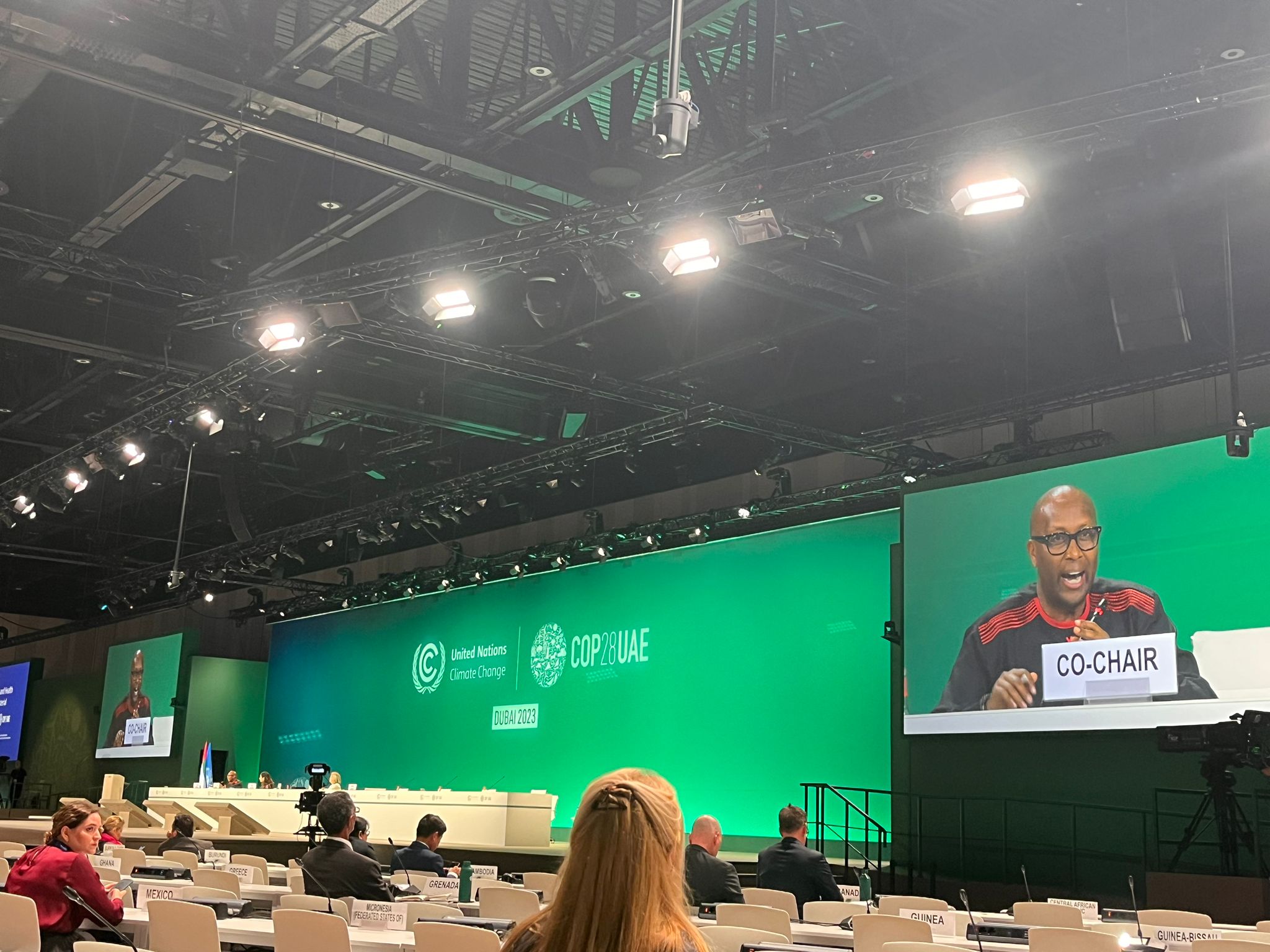
Githinji Gitahi, PMNCH Co-Chair for Strategic Advocacy Committee, speaking at COP28
As the United Nations Framework Convention on Climate Change (UNFCCC) 28th Conference of the Parties (COP28) negotiations on climate change continue to unravel in Dubai, yesterday, on 3 December 2023, the world witnessed an important first for a UNFCCC COP: a dedicated Health Day that saw the agreement of a Climate and Health Declaration signed by over 120 Member States. The excitement surrounding this unprecedented commitment reverberates through the global health community, marking a significant leap in acknowledging and addressing the critical relationship between climate and health.
The Declaration’s acknowledgment of the paramount importance of the health argument in the context of climate change is certainly a cause for hope. This recognition signifies a profound shift in perspective, elevating health to a central position in the global response to climate challenges. As we reflect on this acknowledgment, there is hope and optimism that the objectives outlined in the declaration will not remain mere aspirations, but will translate into tangible actions and feed into the COP28 (and other relevant) outcome documents.
The declaration emphasizes the importance of climate-resilient development and the need to build climate resilient health systems and communities for the well-being of present and future generations. This acknowledgement is crucial and very much in line with the demands of adolescents and young people, expressed during the Global Forum for Adolescents, the world’s largest gathering for adolescents’ well-being.
A key pillar of the declaration is also the commitment to partner with women, girls, children, and youth. As PMNCH young leaders, we look forward to countries maintaining this promise and actively involving young people and all those most affected by climate change in decision making processes.
‘’While the COP28 Climate and Health Declaration does not formally refer to women's, children's, and adolescents' health (WCAH), it is important for us to continue advocating for the explicit recognition of the disproportionate impacts of climate change on these diversified vulnerable groups as this remains crucial for effective, just and equitable gender solutions to climate action, and to protect health’’, says Tasnia Ahmed, PMNCH Adolescent and Youth Constituency Member, SERAC Bangladesh Programme Manager and UNFPA Joint Youth Working Group on SRHR and Climate Change COP28 Delegate, ‘’Let us not forget that climate change is the biggest intergenerational injustice of our times. We need to be engaged in the decision-making affecting our future.’’
The intersectoral approach advocated in the declaration is also a key move towards successful adaptation. By recognizing the interconnectedness of various sectors, including health, environment, and agriculture, the declaration promotes a comprehensive strategy, including through the One Health approach, for tackling the complexities of climate change and the effects on WCAH and well-being.
However, as with any ambitious endeavor, financing and scaling up investments are paramount. As emphasized in the PMNCH Advocacy Brief on climate change and WCAH, there is a need for robust intersectoral financial support in the climate and health intersection.
‘’The devastating impacts of climate change are already affecting the lives of women, children and adolescents globally’’, says Hafsah Muheed, PMNCH Adolescent and Youth Constituency Secretary, Youth Advocacy Sri Lanka Network Member and UNFPA Joint Youth Working Group on SRHR and Climate Change COP28 Delegate, ‘’At this crucial juncture, pledges do not hold value. A commitment is only a true commitment when the funding has been allocated and transferred, otherwise, it's mere words. Climate adaptation and, importantly, loss and damage funds, will be successful only when the most affected countries and people can access the funds to engage in climate interventions’’.
As we look ahead, the COP28 Climate and Health Declaration stands as a light of hope and a roadmap for collective action. Nevertheless, there is still much work to be done. The declaration falls short by not incorporating a crucial demand for an immediate and equitable fossil fuel phase out, highlighting the ongoing need to continue advocating to address the root causes of climate change. The world is currently heading for a 2.5-2.9°C temperature rise above pre-industrial levels unless countries step up action and deliver more than promised in their 2030 pledges under the Paris Agreement. This is already having enormous consequences on women, children and adolescents and their livelihoods worldwide.
The world demands the translation of these commitments into tangible Member State policies, finances and programmes that will pave the way for a resilient, sustainable, and healthy future for WCAH. Climate change is the greatest intergenerational injustice of our times, we have no time to waste. The aim is that this declaration will not just remain a statement but that governments deliver on their obligations and drive transformative change in each country to ensure better, just and equitable integration of health considerations into climate policy processes, and of climate considerations across health policy agendas. The declaration should be considered as a strong starting base on which we can build further, rather than the ceiling for countries’ climate and health ambitions.
Contributions
Hafsah Muheed, member, Youth Advocacy Network Sri Lanka; member, UNFPA Joint Youth Working Group on SRHR and Climate Change; PMNCH Adolescents and Youth Constituency
Katja Čič, Programme Director, International Youth Health Organization (YHO); Co-Chair, WHO Youth Council - Working Group on Climate Change and Health; PMNCH Adolescents and Youth Constituency
Salman Khan, Liaison Officer for Public Health Issues, International Federation of Medical Students’ Associations (IFMSA), PMNCH Health Care Professional Associations Constituency
Sarah Neggazi, Chairperson of Public Health, International Pharmaceutical Students’ Federation (IPSF); PMNCH Health Care Professional Associations Constituency
Tasnia Ahmed, Programme Manager, SERAC Bangladesh; member, UNFPA Joint Youth Working Group on SRHR and Climate Change; PMNCH Adolescents and Youth Constituency

.png?sfvrsn=6d0e27cd_1)



